Football Association Report: Player Development Theories & Strategies
VerifiedAdded on 2023/06/11
|13
|2987
|70
Report
AI Summary
This report provides an overview of player development strategies within the English Football Association (FA), focusing on a case study involving young players. It details the FA's background, motivations, and the main ideas behind their youth development programs. The report explores various player development theories, including the Elite Player Performance Plan (EPPP), and outlines specific skills that young players need to cultivate, such as technical skills, understanding game rules, teamwork, speed, agility, passing, and dribbling. It also discusses the "Four Corner Model" (Technical, Psychological, Physical, and Social) as a comprehensive approach to player development, emphasizing the importance of a player-centered coaching environment. The report concludes by highlighting the FA's commitment to fostering well-rounded individuals, not just athletes, by addressing their psychological, emotional, technical, and physical needs.

Football Development
Report
Report
Paraphrase This Document
Need a fresh take? Get an instant paraphrase of this document with our AI Paraphraser

Contents
Introduction.................................................................................................................................................3
Background of the English Football Association/ Rations for the selected organisation.............................3
Exploring academic view.........................................................................................................................4
Case study...................................................................................................................................................4
Motivation and The Main Ideas...................................................................................................................5
Player Development theories around the subject area...........................................................................5
Development Strategy in Young Players......................................................................................................5
Theory.........................................................................................................................................................7
Development model....................................................................................................................................8
Conclusion.................................................................................................................................................10
References.................................................................................................................................................11
Introduction.................................................................................................................................................3
Background of the English Football Association/ Rations for the selected organisation.............................3
Exploring academic view.........................................................................................................................4
Case study...................................................................................................................................................4
Motivation and The Main Ideas...................................................................................................................5
Player Development theories around the subject area...........................................................................5
Development Strategy in Young Players......................................................................................................5
Theory.........................................................................................................................................................7
Development model....................................................................................................................................8
Conclusion.................................................................................................................................................10
References.................................................................................................................................................11
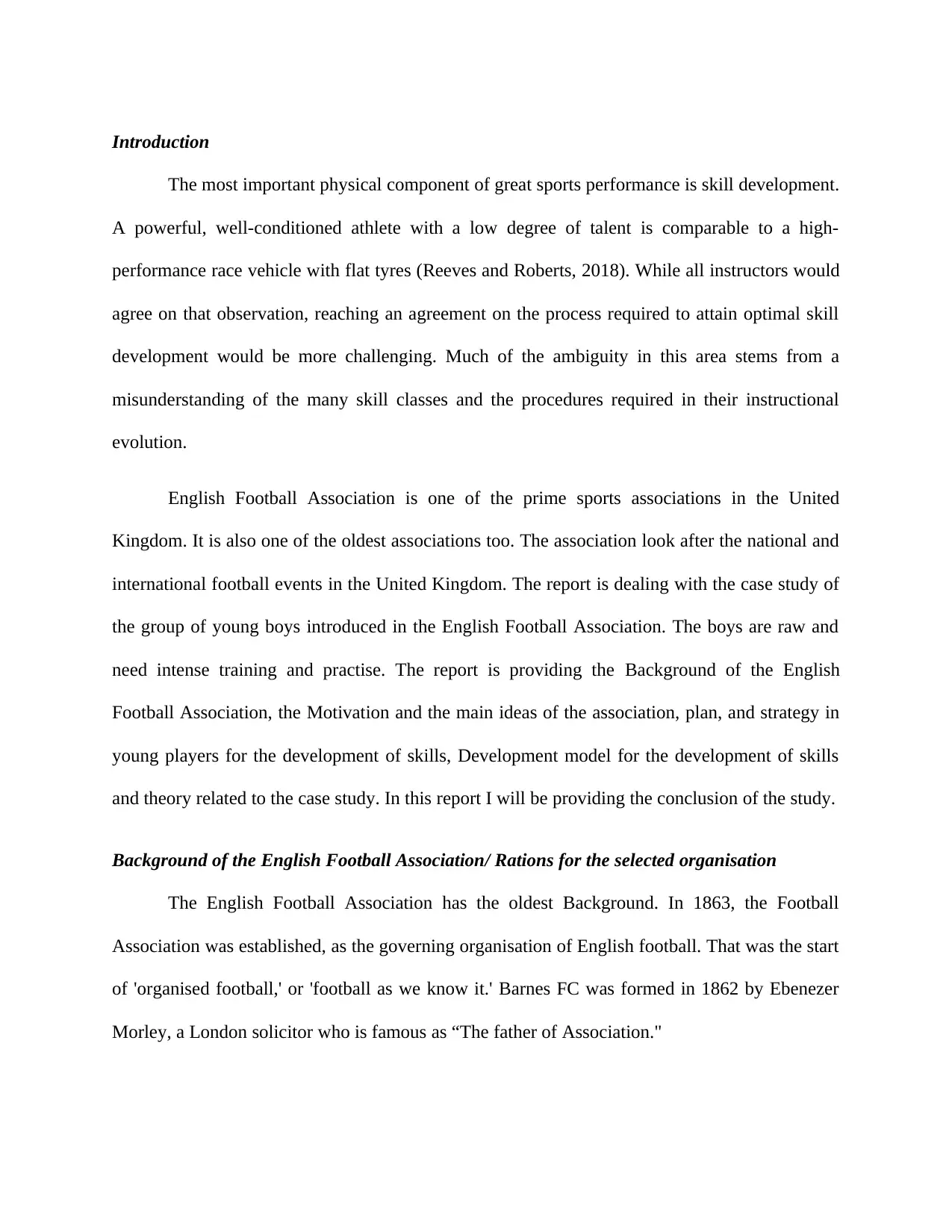
Introduction
The most important physical component of great sports performance is skill development.
A powerful, well-conditioned athlete with a low degree of talent is comparable to a high-
performance race vehicle with flat tyres (Reeves and Roberts, 2018). While all instructors would
agree on that observation, reaching an agreement on the process required to attain optimal skill
development would be more challenging. Much of the ambiguity in this area stems from a
misunderstanding of the many skill classes and the procedures required in their instructional
evolution.
English Football Association is one of the prime sports associations in the United
Kingdom. It is also one of the oldest associations too. The association look after the national and
international football events in the United Kingdom. The report is dealing with the case study of
the group of young boys introduced in the English Football Association. The boys are raw and
need intense training and practise. The report is providing the Background of the English
Football Association, the Motivation and the main ideas of the association, plan, and strategy in
young players for the development of skills, Development model for the development of skills
and theory related to the case study. In this report I will be providing the conclusion of the study.
Background of the English Football Association/ Rations for the selected organisation
The English Football Association has the oldest Background. In 1863, the Football
Association was established, as the governing organisation of English football. That was the start
of 'organised football,' or 'football as we know it.' Barnes FC was formed in 1862 by Ebenezer
Morley, a London solicitor who is famous as “The father of Association."
The most important physical component of great sports performance is skill development.
A powerful, well-conditioned athlete with a low degree of talent is comparable to a high-
performance race vehicle with flat tyres (Reeves and Roberts, 2018). While all instructors would
agree on that observation, reaching an agreement on the process required to attain optimal skill
development would be more challenging. Much of the ambiguity in this area stems from a
misunderstanding of the many skill classes and the procedures required in their instructional
evolution.
English Football Association is one of the prime sports associations in the United
Kingdom. It is also one of the oldest associations too. The association look after the national and
international football events in the United Kingdom. The report is dealing with the case study of
the group of young boys introduced in the English Football Association. The boys are raw and
need intense training and practise. The report is providing the Background of the English
Football Association, the Motivation and the main ideas of the association, plan, and strategy in
young players for the development of skills, Development model for the development of skills
and theory related to the case study. In this report I will be providing the conclusion of the study.
Background of the English Football Association/ Rations for the selected organisation
The English Football Association has the oldest Background. In 1863, the Football
Association was established, as the governing organisation of English football. That was the start
of 'organised football,' or 'football as we know it.' Barnes FC was formed in 1862 by Ebenezer
Morley, a London solicitor who is famous as “The father of Association."
⊘ This is a preview!⊘
Do you want full access?
Subscribe today to unlock all pages.

Trusted by 1+ million students worldwide
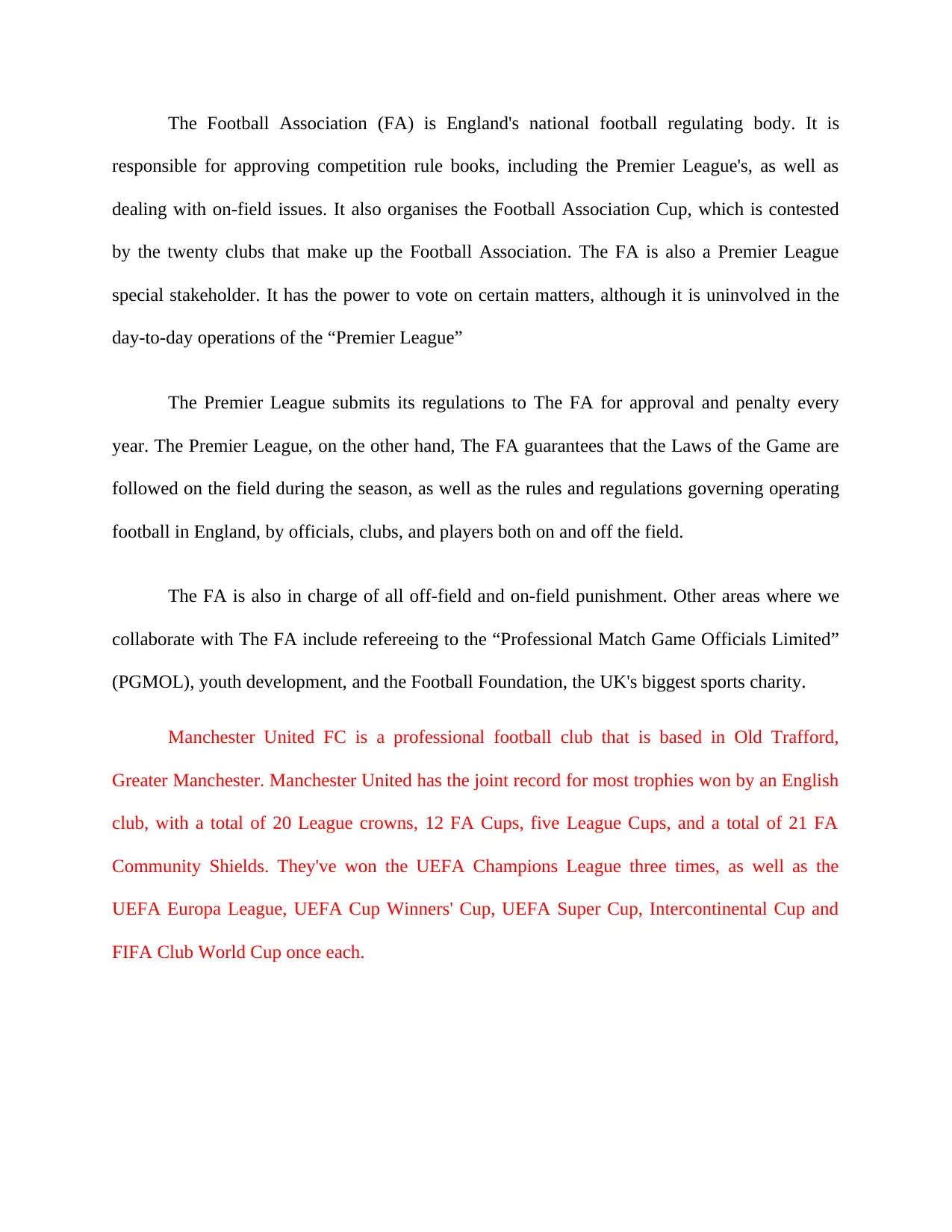
The Football Association (FA) is England's national football regulating body. It is
responsible for approving competition rule books, including the Premier League's, as well as
dealing with on-field issues. It also organises the Football Association Cup, which is contested
by the twenty clubs that make up the Football Association. The FA is also a Premier League
special stakeholder. It has the power to vote on certain matters, although it is uninvolved in the
day-to-day operations of the “Premier League”
The Premier League submits its regulations to The FA for approval and penalty every
year. The Premier League, on the other hand, The FA guarantees that the Laws of the Game are
followed on the field during the season, as well as the rules and regulations governing operating
football in England, by officials, clubs, and players both on and off the field.
The FA is also in charge of all off-field and on-field punishment. Other areas where we
collaborate with The FA include refereeing to the “Professional Match Game Officials Limited”
(PGMOL), youth development, and the Football Foundation, the UK's biggest sports charity.
Manchester United FC is a professional football club that is based in Old Trafford,
Greater Manchester. Manchester United has the joint record for most trophies won by an English
club, with a total of 20 League crowns, 12 FA Cups, five League Cups, and a total of 21 FA
Community Shields. They've won the UEFA Champions League three times, as well as the
UEFA Europa League, UEFA Cup Winners' Cup, UEFA Super Cup, Intercontinental Cup and
FIFA Club World Cup once each.
responsible for approving competition rule books, including the Premier League's, as well as
dealing with on-field issues. It also organises the Football Association Cup, which is contested
by the twenty clubs that make up the Football Association. The FA is also a Premier League
special stakeholder. It has the power to vote on certain matters, although it is uninvolved in the
day-to-day operations of the “Premier League”
The Premier League submits its regulations to The FA for approval and penalty every
year. The Premier League, on the other hand, The FA guarantees that the Laws of the Game are
followed on the field during the season, as well as the rules and regulations governing operating
football in England, by officials, clubs, and players both on and off the field.
The FA is also in charge of all off-field and on-field punishment. Other areas where we
collaborate with The FA include refereeing to the “Professional Match Game Officials Limited”
(PGMOL), youth development, and the Football Foundation, the UK's biggest sports charity.
Manchester United FC is a professional football club that is based in Old Trafford,
Greater Manchester. Manchester United has the joint record for most trophies won by an English
club, with a total of 20 League crowns, 12 FA Cups, five League Cups, and a total of 21 FA
Community Shields. They've won the UEFA Champions League three times, as well as the
UEFA Europa League, UEFA Cup Winners' Cup, UEFA Super Cup, Intercontinental Cup and
FIFA Club World Cup once each.
Paraphrase This Document
Need a fresh take? Get an instant paraphrase of this document with our AI Paraphraser
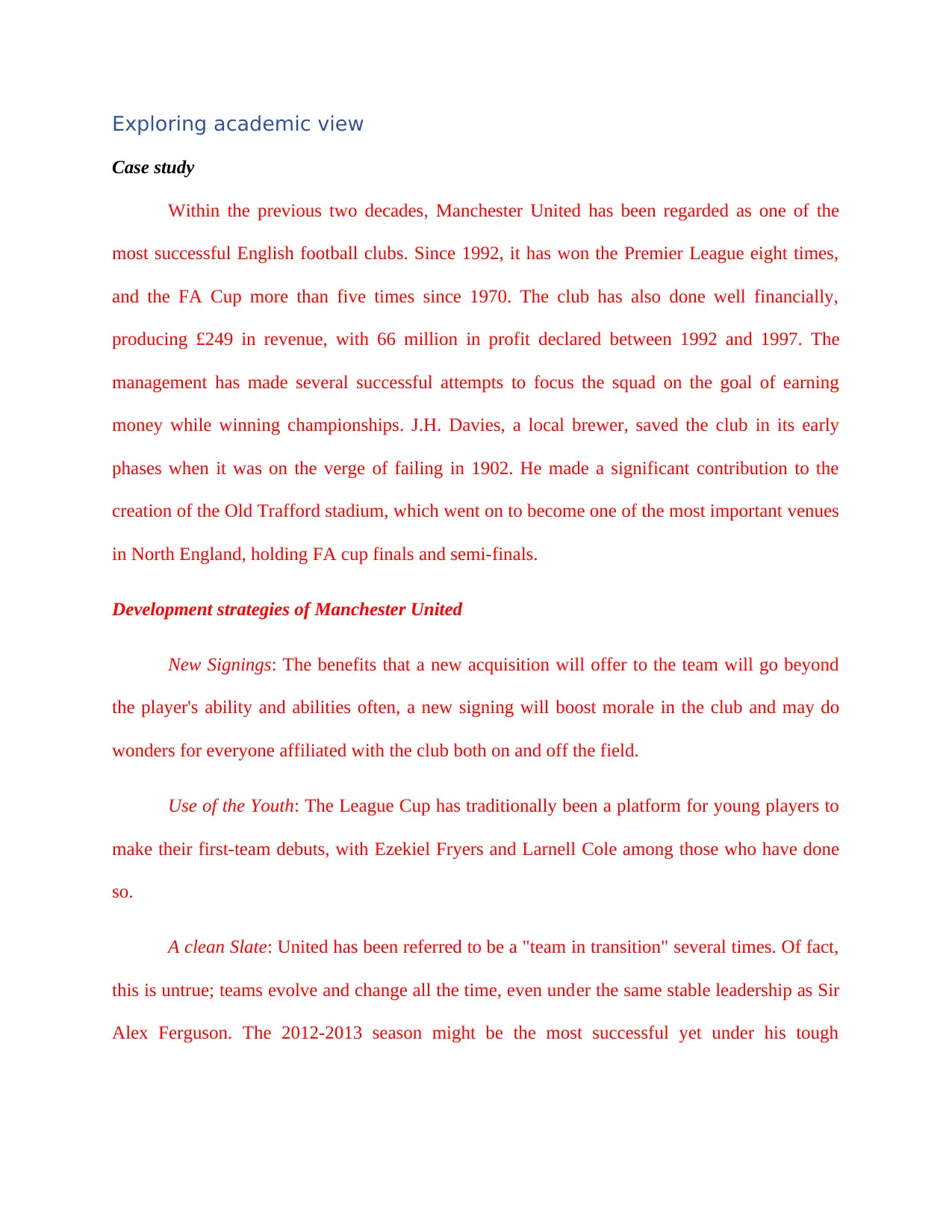
Exploring academic view
Case study
Within the previous two decades, Manchester United has been regarded as one of the
most successful English football clubs. Since 1992, it has won the Premier League eight times,
and the FA Cup more than five times since 1970. The club has also done well financially,
producing £249 in revenue, with 66 million in profit declared between 1992 and 1997. The
management has made several successful attempts to focus the squad on the goal of earning
money while winning championships. J.H. Davies, a local brewer, saved the club in its early
phases when it was on the verge of failing in 1902. He made a significant contribution to the
creation of the Old Trafford stadium, which went on to become one of the most important venues
in North England, holding FA cup finals and semi-finals.
Development strategies of Manchester United
New Signings: The benefits that a new acquisition will offer to the team will go beyond
the player's ability and abilities often, a new signing will boost morale in the club and may do
wonders for everyone affiliated with the club both on and off the field.
Use of the Youth: The League Cup has traditionally been a platform for young players to
make their first-team debuts, with Ezekiel Fryers and Larnell Cole among those who have done
so.
A clean Slate: United has been referred to be a "team in transition" several times. Of fact,
this is untrue; teams evolve and change all the time, even under the same stable leadership as Sir
Alex Ferguson. The 2012-2013 season might be the most successful yet under his tough
Case study
Within the previous two decades, Manchester United has been regarded as one of the
most successful English football clubs. Since 1992, it has won the Premier League eight times,
and the FA Cup more than five times since 1970. The club has also done well financially,
producing £249 in revenue, with 66 million in profit declared between 1992 and 1997. The
management has made several successful attempts to focus the squad on the goal of earning
money while winning championships. J.H. Davies, a local brewer, saved the club in its early
phases when it was on the verge of failing in 1902. He made a significant contribution to the
creation of the Old Trafford stadium, which went on to become one of the most important venues
in North England, holding FA cup finals and semi-finals.
Development strategies of Manchester United
New Signings: The benefits that a new acquisition will offer to the team will go beyond
the player's ability and abilities often, a new signing will boost morale in the club and may do
wonders for everyone affiliated with the club both on and off the field.
Use of the Youth: The League Cup has traditionally been a platform for young players to
make their first-team debuts, with Ezekiel Fryers and Larnell Cole among those who have done
so.
A clean Slate: United has been referred to be a "team in transition" several times. Of fact,
this is untrue; teams evolve and change all the time, even under the same stable leadership as Sir
Alex Ferguson. The 2012-2013 season might be the most successful yet under his tough
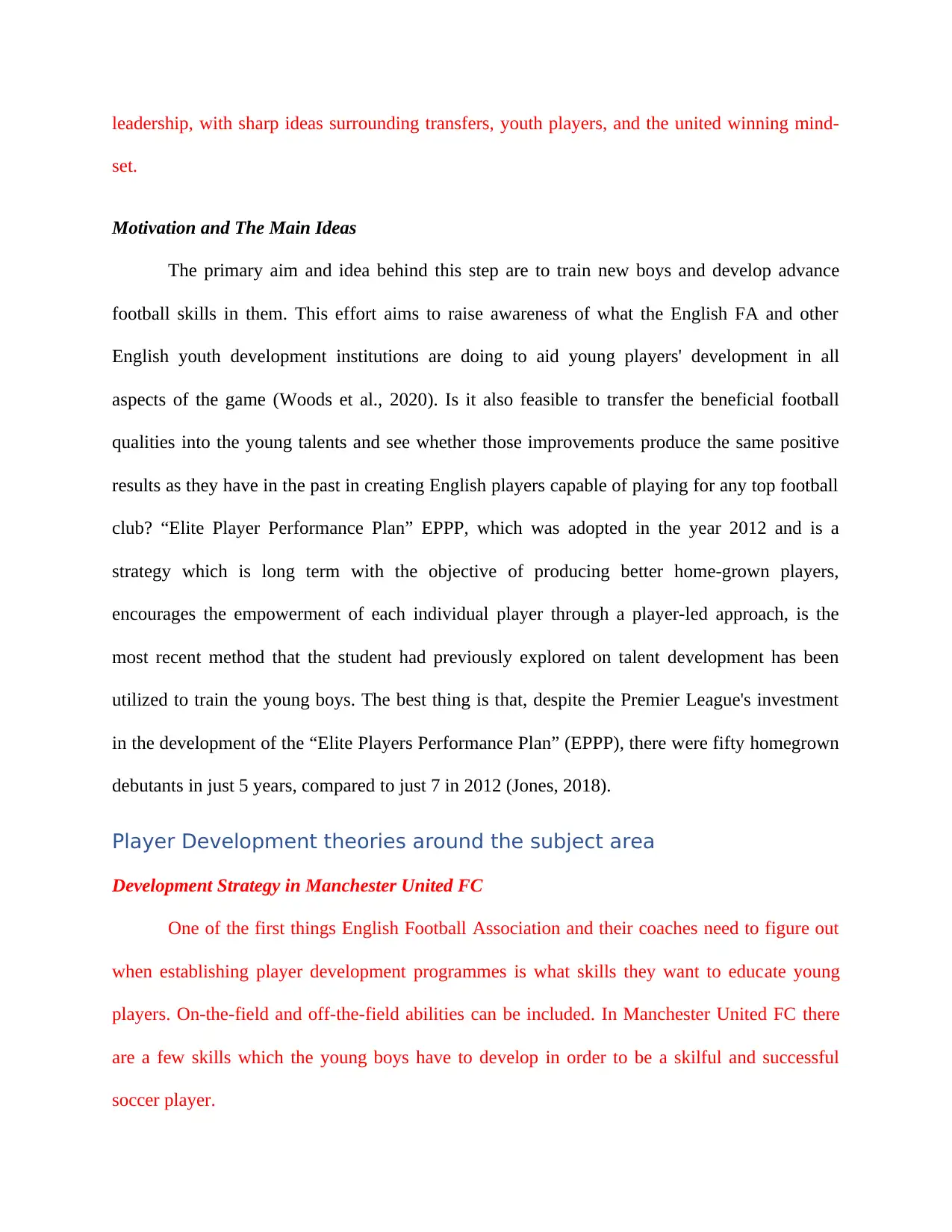
leadership, with sharp ideas surrounding transfers, youth players, and the united winning mind-
set.
Motivation and The Main Ideas
The primary aim and idea behind this step are to train new boys and develop advance
football skills in them. This effort aims to raise awareness of what the English FA and other
English youth development institutions are doing to aid young players' development in all
aspects of the game (Woods et al., 2020). Is it also feasible to transfer the beneficial football
qualities into the young talents and see whether those improvements produce the same positive
results as they have in the past in creating English players capable of playing for any top football
club? “Elite Player Performance Plan” EPPP, which was adopted in the year 2012 and is a
strategy which is long term with the objective of producing better home-grown players,
encourages the empowerment of each individual player through a player-led approach, is the
most recent method that the student had previously explored on talent development has been
utilized to train the young boys. The best thing is that, despite the Premier League's investment
in the development of the “Elite Players Performance Plan” (EPPP), there were fifty homegrown
debutants in just 5 years, compared to just 7 in 2012 (Jones, 2018).
Player Development theories around the subject area
Development Strategy in Manchester United FC
One of the first things English Football Association and their coaches need to figure out
when establishing player development programmes is what skills they want to educate young
players. On-the-field and off-the-field abilities can be included. In Manchester United FC there
are a few skills which the young boys have to develop in order to be a skilful and successful
soccer player.
set.
Motivation and The Main Ideas
The primary aim and idea behind this step are to train new boys and develop advance
football skills in them. This effort aims to raise awareness of what the English FA and other
English youth development institutions are doing to aid young players' development in all
aspects of the game (Woods et al., 2020). Is it also feasible to transfer the beneficial football
qualities into the young talents and see whether those improvements produce the same positive
results as they have in the past in creating English players capable of playing for any top football
club? “Elite Player Performance Plan” EPPP, which was adopted in the year 2012 and is a
strategy which is long term with the objective of producing better home-grown players,
encourages the empowerment of each individual player through a player-led approach, is the
most recent method that the student had previously explored on talent development has been
utilized to train the young boys. The best thing is that, despite the Premier League's investment
in the development of the “Elite Players Performance Plan” (EPPP), there were fifty homegrown
debutants in just 5 years, compared to just 7 in 2012 (Jones, 2018).
Player Development theories around the subject area
Development Strategy in Manchester United FC
One of the first things English Football Association and their coaches need to figure out
when establishing player development programmes is what skills they want to educate young
players. On-the-field and off-the-field abilities can be included. In Manchester United FC there
are a few skills which the young boys have to develop in order to be a skilful and successful
soccer player.
⊘ This is a preview!⊘
Do you want full access?
Subscribe today to unlock all pages.

Trusted by 1+ million students worldwide
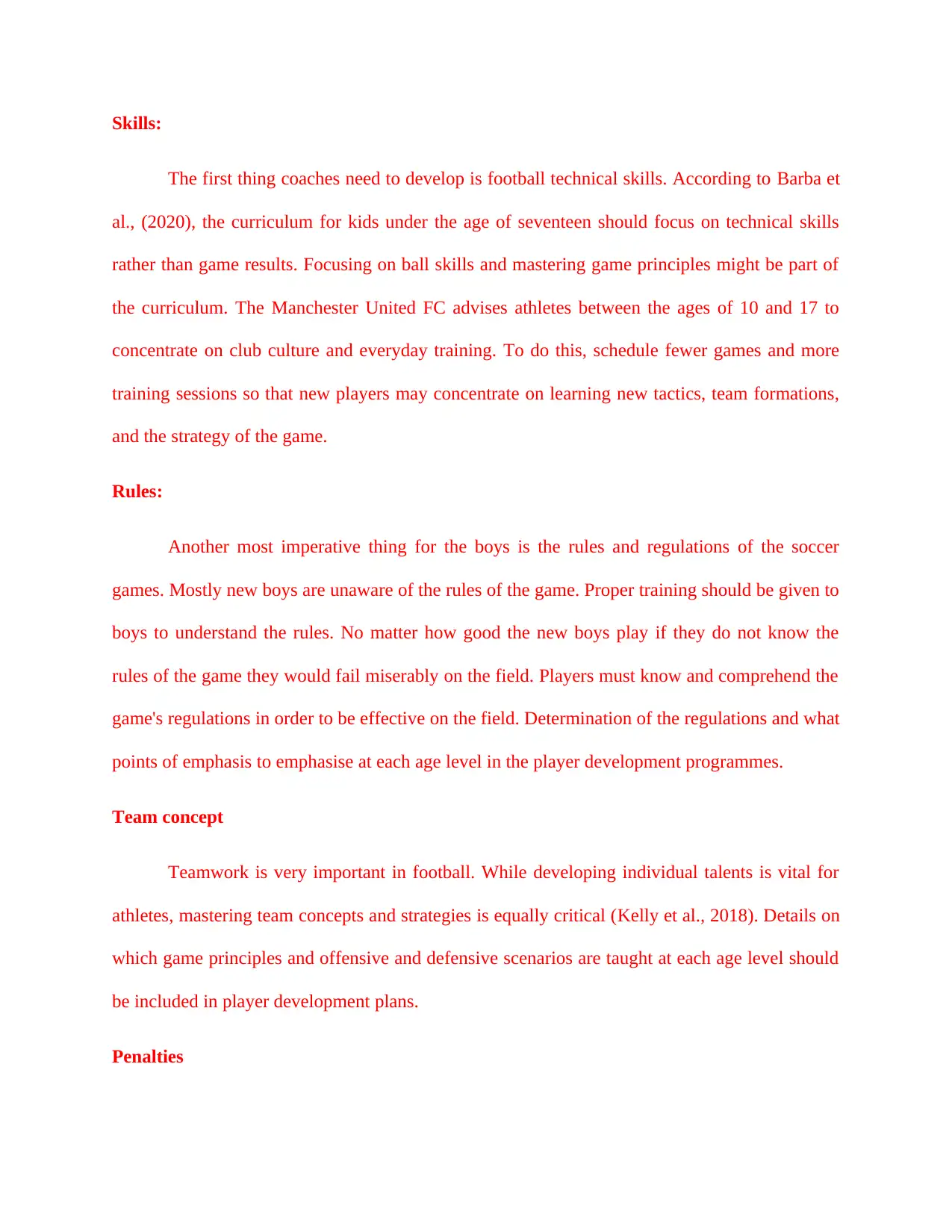
Skills:
The first thing coaches need to develop is football technical skills. According to Barba et
al., (2020), the curriculum for kids under the age of seventeen should focus on technical skills
rather than game results. Focusing on ball skills and mastering game principles might be part of
the curriculum. The Manchester United FC advises athletes between the ages of 10 and 17 to
concentrate on club culture and everyday training. To do this, schedule fewer games and more
training sessions so that new players may concentrate on learning new tactics, team formations,
and the strategy of the game.
Rules:
Another most imperative thing for the boys is the rules and regulations of the soccer
games. Mostly new boys are unaware of the rules of the game. Proper training should be given to
boys to understand the rules. No matter how good the new boys play if they do not know the
rules of the game they would fail miserably on the field. Players must know and comprehend the
game's regulations in order to be effective on the field. Determination of the regulations and what
points of emphasis to emphasise at each age level in the player development programmes.
Team concept
Teamwork is very important in football. While developing individual talents is vital for
athletes, mastering team concepts and strategies is equally critical (Kelly et al., 2018). Details on
which game principles and offensive and defensive scenarios are taught at each age level should
be included in player development plans.
Penalties
The first thing coaches need to develop is football technical skills. According to Barba et
al., (2020), the curriculum for kids under the age of seventeen should focus on technical skills
rather than game results. Focusing on ball skills and mastering game principles might be part of
the curriculum. The Manchester United FC advises athletes between the ages of 10 and 17 to
concentrate on club culture and everyday training. To do this, schedule fewer games and more
training sessions so that new players may concentrate on learning new tactics, team formations,
and the strategy of the game.
Rules:
Another most imperative thing for the boys is the rules and regulations of the soccer
games. Mostly new boys are unaware of the rules of the game. Proper training should be given to
boys to understand the rules. No matter how good the new boys play if they do not know the
rules of the game they would fail miserably on the field. Players must know and comprehend the
game's regulations in order to be effective on the field. Determination of the regulations and what
points of emphasis to emphasise at each age level in the player development programmes.
Team concept
Teamwork is very important in football. While developing individual talents is vital for
athletes, mastering team concepts and strategies is equally critical (Kelly et al., 2018). Details on
which game principles and offensive and defensive scenarios are taught at each age level should
be included in player development plans.
Penalties
Paraphrase This Document
Need a fresh take? Get an instant paraphrase of this document with our AI Paraphraser
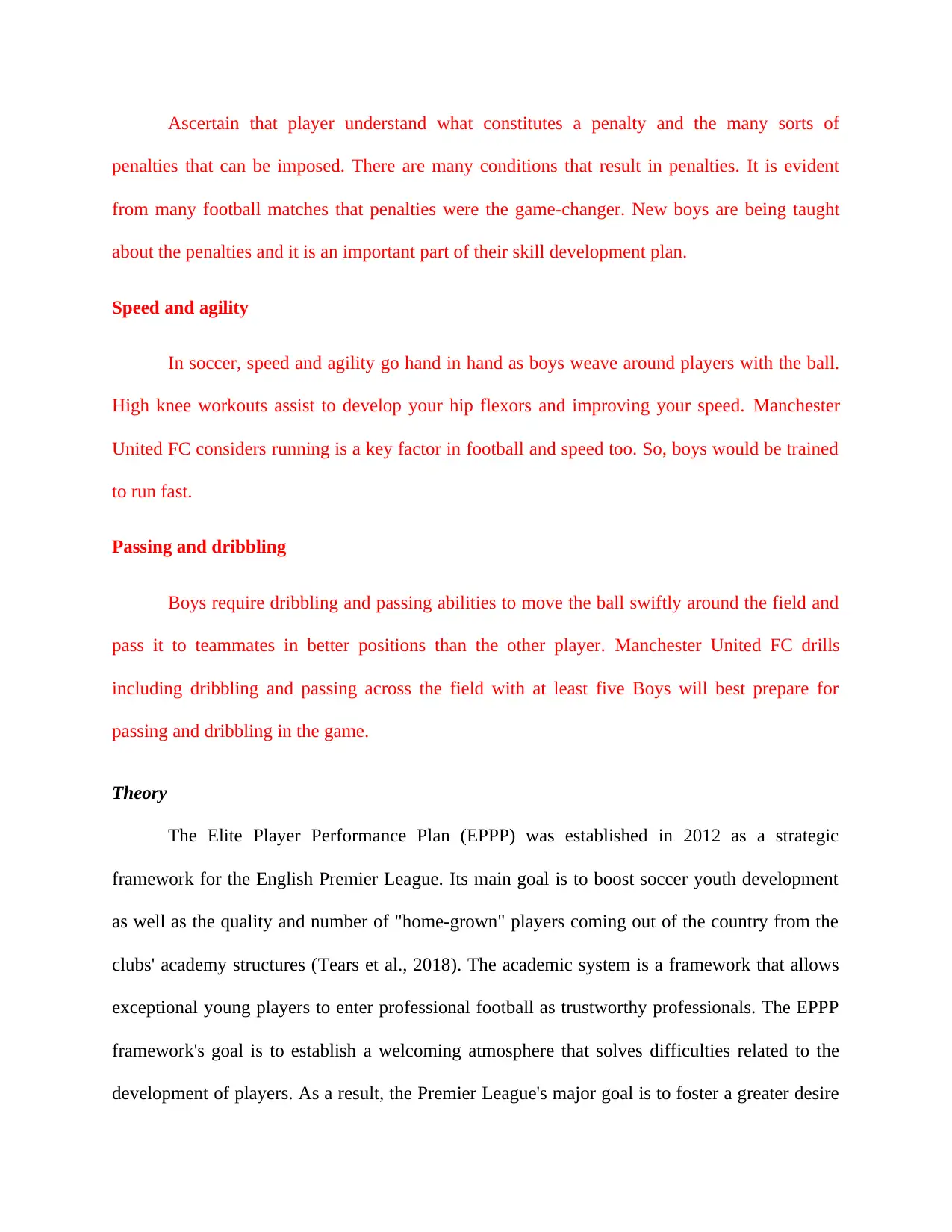
Ascertain that player understand what constitutes a penalty and the many sorts of
penalties that can be imposed. There are many conditions that result in penalties. It is evident
from many football matches that penalties were the game-changer. New boys are being taught
about the penalties and it is an important part of their skill development plan.
Speed and agility
In soccer, speed and agility go hand in hand as boys weave around players with the ball.
High knee workouts assist to develop your hip flexors and improving your speed. Manchester
United FC considers running is a key factor in football and speed too. So, boys would be trained
to run fast.
Passing and dribbling
Boys require dribbling and passing abilities to move the ball swiftly around the field and
pass it to teammates in better positions than the other player. Manchester United FC drills
including dribbling and passing across the field with at least five Boys will best prepare for
passing and dribbling in the game.
Theory
The Elite Player Performance Plan (EPPP) was established in 2012 as a strategic
framework for the English Premier League. Its main goal is to boost soccer youth development
as well as the quality and number of "home-grown" players coming out of the country from the
clubs' academy structures (Tears et al., 2018). The academic system is a framework that allows
exceptional young players to enter professional football as trustworthy professionals. The EPPP
framework's goal is to establish a welcoming atmosphere that solves difficulties related to the
development of players. As a result, the Premier League's major goal is to foster a greater desire
penalties that can be imposed. There are many conditions that result in penalties. It is evident
from many football matches that penalties were the game-changer. New boys are being taught
about the penalties and it is an important part of their skill development plan.
Speed and agility
In soccer, speed and agility go hand in hand as boys weave around players with the ball.
High knee workouts assist to develop your hip flexors and improving your speed. Manchester
United FC considers running is a key factor in football and speed too. So, boys would be trained
to run fast.
Passing and dribbling
Boys require dribbling and passing abilities to move the ball swiftly around the field and
pass it to teammates in better positions than the other player. Manchester United FC drills
including dribbling and passing across the field with at least five Boys will best prepare for
passing and dribbling in the game.
Theory
The Elite Player Performance Plan (EPPP) was established in 2012 as a strategic
framework for the English Premier League. Its main goal is to boost soccer youth development
as well as the quality and number of "home-grown" players coming out of the country from the
clubs' academy structures (Tears et al., 2018). The academic system is a framework that allows
exceptional young players to enter professional football as trustworthy professionals. The EPPP
framework's goal is to establish a welcoming atmosphere that solves difficulties related to the
development of players. As a result, the Premier League's major goal is to foster a greater desire
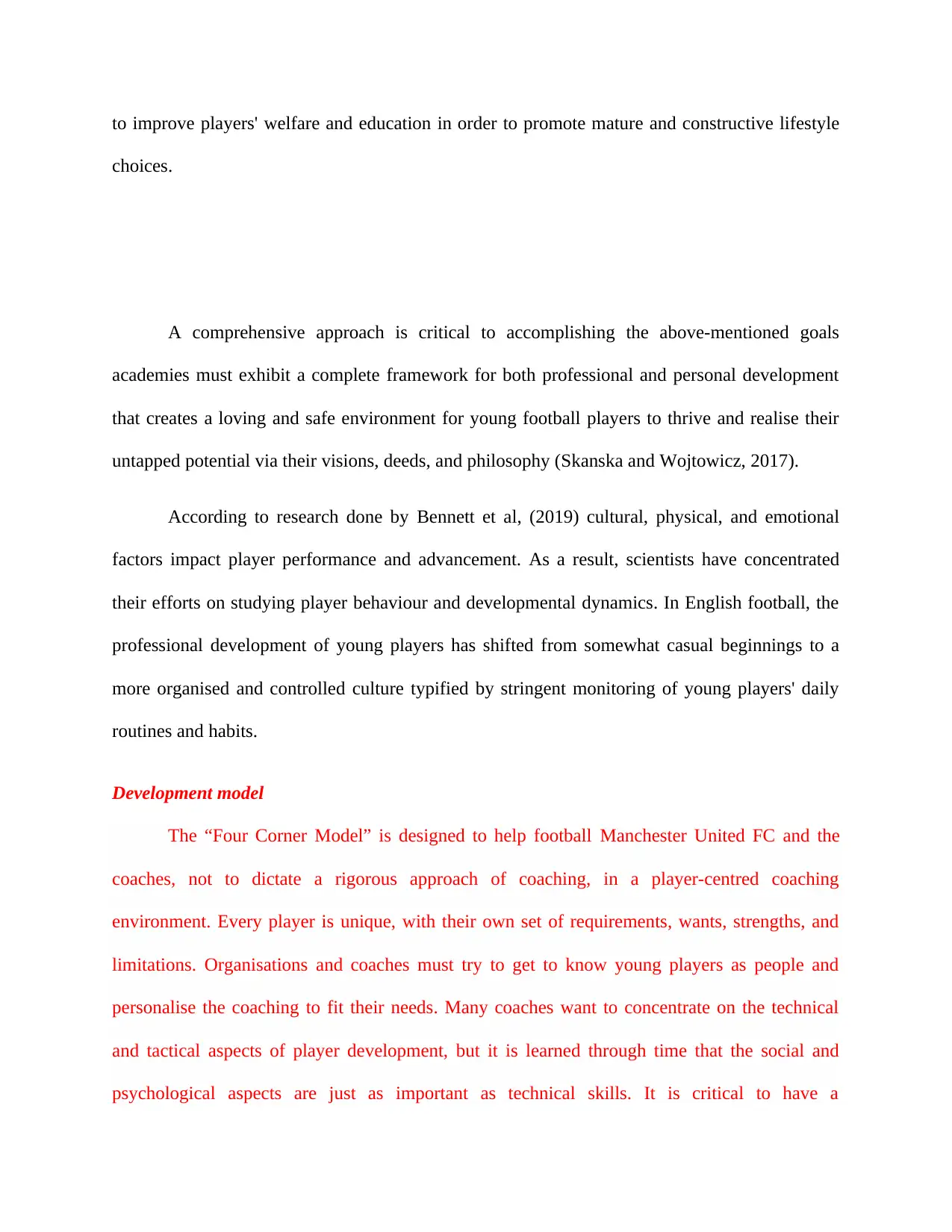
to improve players' welfare and education in order to promote mature and constructive lifestyle
choices.
A comprehensive approach is critical to accomplishing the above-mentioned goals
academies must exhibit a complete framework for both professional and personal development
that creates a loving and safe environment for young football players to thrive and realise their
untapped potential via their visions, deeds, and philosophy (Skanska and Wojtowicz, 2017).
According to research done by Bennett et al, (2019) cultural, physical, and emotional
factors impact player performance and advancement. As a result, scientists have concentrated
their efforts on studying player behaviour and developmental dynamics. In English football, the
professional development of young players has shifted from somewhat casual beginnings to a
more organised and controlled culture typified by stringent monitoring of young players' daily
routines and habits.
Development model
The “Four Corner Model” is designed to help football Manchester United FC and the
coaches, not to dictate a rigorous approach of coaching, in a player-centred coaching
environment. Every player is unique, with their own set of requirements, wants, strengths, and
limitations. Organisations and coaches must try to get to know young players as people and
personalise the coaching to fit their needs. Many coaches want to concentrate on the technical
and tactical aspects of player development, but it is learned through time that the social and
psychological aspects are just as important as technical skills. It is critical to have a
choices.
A comprehensive approach is critical to accomplishing the above-mentioned goals
academies must exhibit a complete framework for both professional and personal development
that creates a loving and safe environment for young football players to thrive and realise their
untapped potential via their visions, deeds, and philosophy (Skanska and Wojtowicz, 2017).
According to research done by Bennett et al, (2019) cultural, physical, and emotional
factors impact player performance and advancement. As a result, scientists have concentrated
their efforts on studying player behaviour and developmental dynamics. In English football, the
professional development of young players has shifted from somewhat casual beginnings to a
more organised and controlled culture typified by stringent monitoring of young players' daily
routines and habits.
Development model
The “Four Corner Model” is designed to help football Manchester United FC and the
coaches, not to dictate a rigorous approach of coaching, in a player-centred coaching
environment. Every player is unique, with their own set of requirements, wants, strengths, and
limitations. Organisations and coaches must try to get to know young players as people and
personalise the coaching to fit their needs. Many coaches want to concentrate on the technical
and tactical aspects of player development, but it is learned through time that the social and
psychological aspects are just as important as technical skills. It is critical to have a
⊘ This is a preview!⊘
Do you want full access?
Subscribe today to unlock all pages.

Trusted by 1+ million students worldwide
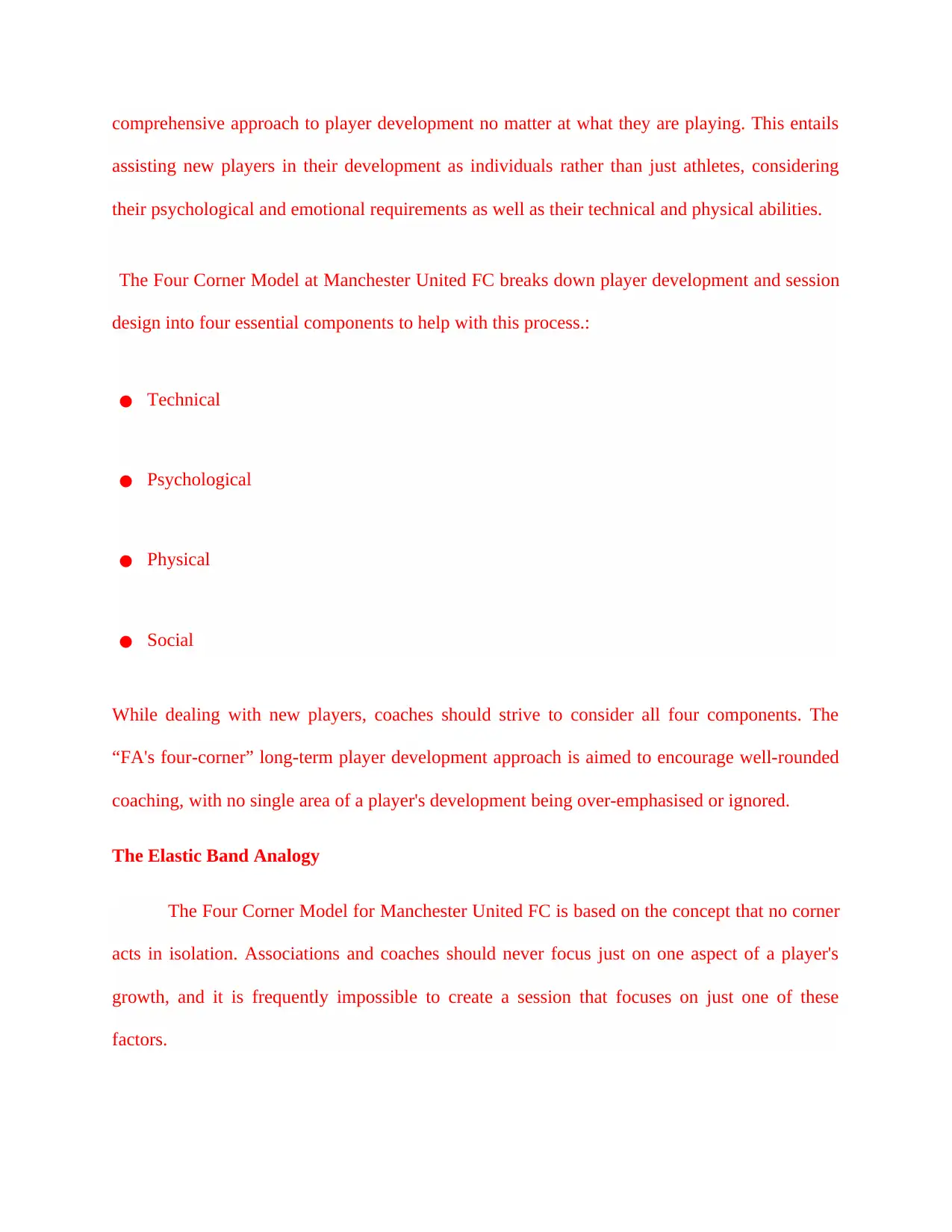
comprehensive approach to player development no matter at what they are playing. This entails
assisting new players in their development as individuals rather than just athletes, considering
their psychological and emotional requirements as well as their technical and physical abilities.
The Four Corner Model at Manchester United FC breaks down player development and session
design into four essential components to help with this process.:
● Technical
● Psychological
● Physical
● Social
While dealing with new players, coaches should strive to consider all four components. The
“FA's four-corner” long-term player development approach is aimed to encourage well-rounded
coaching, with no single area of a player's development being over-emphasised or ignored.
The Elastic Band Analogy
The Four Corner Model for Manchester United FC is based on the concept that no corner
acts in isolation. Associations and coaches should never focus just on one aspect of a player's
growth, and it is frequently impossible to create a session that focuses on just one of these
factors.
assisting new players in their development as individuals rather than just athletes, considering
their psychological and emotional requirements as well as their technical and physical abilities.
The Four Corner Model at Manchester United FC breaks down player development and session
design into four essential components to help with this process.:
● Technical
● Psychological
● Physical
● Social
While dealing with new players, coaches should strive to consider all four components. The
“FA's four-corner” long-term player development approach is aimed to encourage well-rounded
coaching, with no single area of a player's development being over-emphasised or ignored.
The Elastic Band Analogy
The Four Corner Model for Manchester United FC is based on the concept that no corner
acts in isolation. Associations and coaches should never focus just on one aspect of a player's
growth, and it is frequently impossible to create a session that focuses on just one of these
factors.
Paraphrase This Document
Need a fresh take? Get an instant paraphrase of this document with our AI Paraphraser
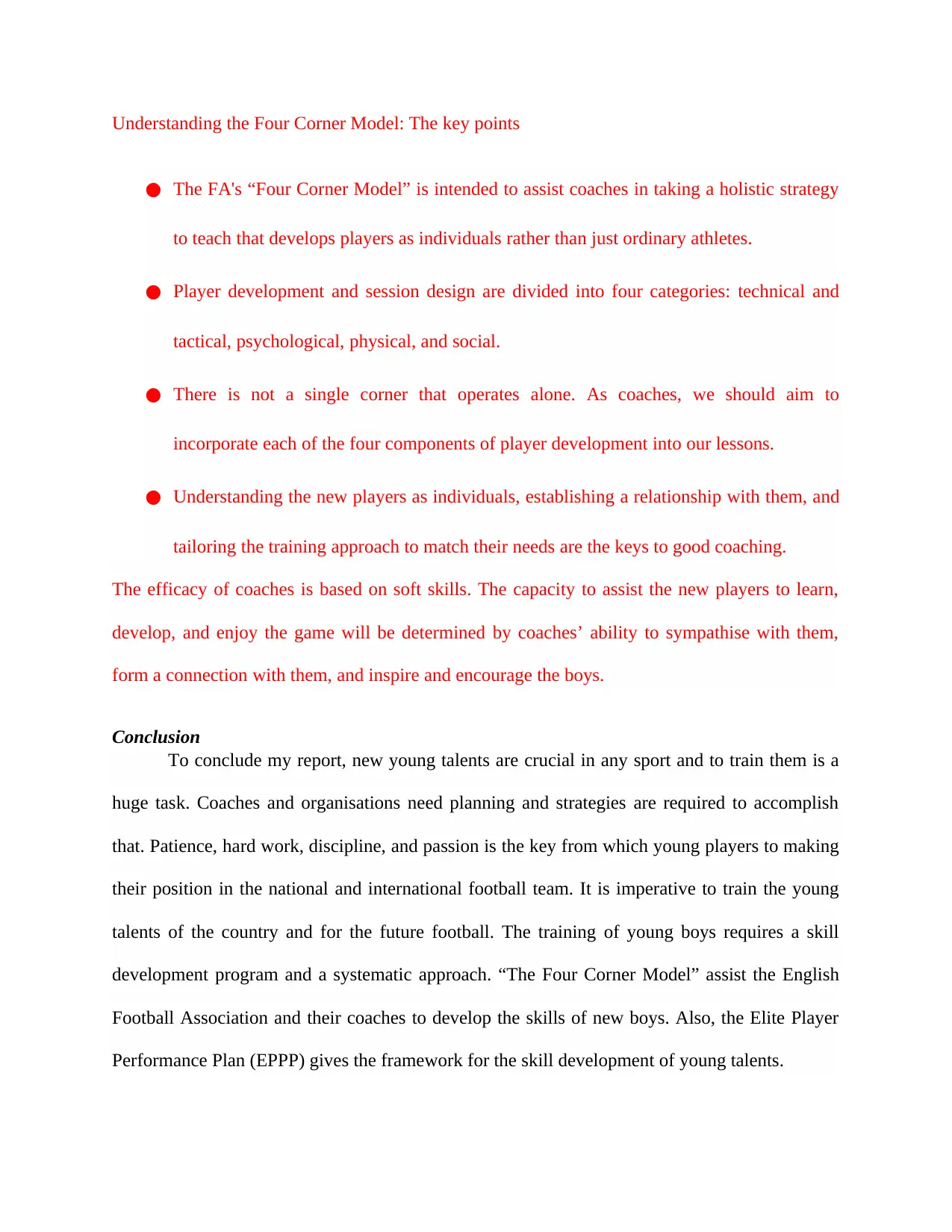
Understanding the Four Corner Model: The key points
● The FA's “Four Corner Model” is intended to assist coaches in taking a holistic strategy
to teach that develops players as individuals rather than just ordinary athletes.
● Player development and session design are divided into four categories: technical and
tactical, psychological, physical, and social.
● There is not a single corner that operates alone. As coaches, we should aim to
incorporate each of the four components of player development into our lessons.
● Understanding the new players as individuals, establishing a relationship with them, and
tailoring the training approach to match their needs are the keys to good coaching.
The efficacy of coaches is based on soft skills. The capacity to assist the new players to learn,
develop, and enjoy the game will be determined by coaches’ ability to sympathise with them,
form a connection with them, and inspire and encourage the boys.
Conclusion
To conclude my report, new young talents are crucial in any sport and to train them is a
huge task. Coaches and organisations need planning and strategies are required to accomplish
that. Patience, hard work, discipline, and passion is the key from which young players to making
their position in the national and international football team. It is imperative to train the young
talents of the country and for the future football. The training of young boys requires a skill
development program and a systematic approach. “The Four Corner Model” assist the English
Football Association and their coaches to develop the skills of new boys. Also, the Elite Player
Performance Plan (EPPP) gives the framework for the skill development of young talents.
● The FA's “Four Corner Model” is intended to assist coaches in taking a holistic strategy
to teach that develops players as individuals rather than just ordinary athletes.
● Player development and session design are divided into four categories: technical and
tactical, psychological, physical, and social.
● There is not a single corner that operates alone. As coaches, we should aim to
incorporate each of the four components of player development into our lessons.
● Understanding the new players as individuals, establishing a relationship with them, and
tailoring the training approach to match their needs are the keys to good coaching.
The efficacy of coaches is based on soft skills. The capacity to assist the new players to learn,
develop, and enjoy the game will be determined by coaches’ ability to sympathise with them,
form a connection with them, and inspire and encourage the boys.
Conclusion
To conclude my report, new young talents are crucial in any sport and to train them is a
huge task. Coaches and organisations need planning and strategies are required to accomplish
that. Patience, hard work, discipline, and passion is the key from which young players to making
their position in the national and international football team. It is imperative to train the young
talents of the country and for the future football. The training of young boys requires a skill
development program and a systematic approach. “The Four Corner Model” assist the English
Football Association and their coaches to develop the skills of new boys. Also, the Elite Player
Performance Plan (EPPP) gives the framework for the skill development of young talents.

⊘ This is a preview!⊘
Do you want full access?
Subscribe today to unlock all pages.

Trusted by 1+ million students worldwide
1 out of 13
Your All-in-One AI-Powered Toolkit for Academic Success.
+13062052269
info@desklib.com
Available 24*7 on WhatsApp / Email
![[object Object]](/_next/static/media/star-bottom.7253800d.svg)
Unlock your academic potential
Copyright © 2020–2025 A2Z Services. All Rights Reserved. Developed and managed by ZUCOL.


